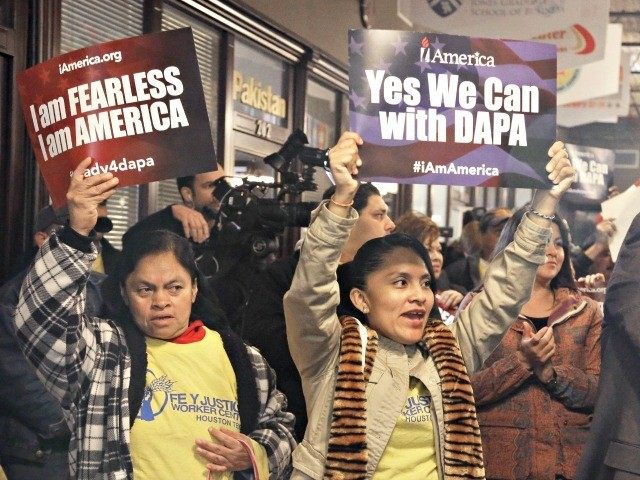Deferred Action for Parents of Americans and Lawful Permanent Residents (DAPA)— an executive amnesty program President Obama announced in November — has “key electoral implications,” the liberal Center for American Progress concludes.
The Obama administration’s DAPA program would provide legal status and work permits to millions of illegal immigrant parents of U.S. citizens and legal permanent residents.
According to a new CAP analysis released Tuesday, the estimated 3.7 million illegal immigrants who might qualify for DAPA have 5.5 million U.S. citizen children who either can or will be eligible to vote.
“These numbers could provide sizable contributions to the margin of victory in swing states. In Florida during the 2012 presidential election, for example, these new voters would have comprised 70 percent of the margin of victory; in North Carolina, they would have represented one-third of the margin of victory,” the CAP analysis, authored by CAP’s associate director of immigration policy Lizet Ocampo, reads.
“These figures do not take into account other citizen members of “mixed-status” households that include DAPA-eligible individuals—voters who would also feel the effect of DAPA implementation,” the report adds.
The report alludes to the idea that the children of illegal immigrant DAPA beneficiaries will likely vote against the Republican critics of executive amnesty.
“Opponents of DAPA will likely alienate a critical and growing voting demographic within the United States while champions of the program are likely to engender significant support from these same voters,” the report reads.
Ocampo’s analysis further points to the fact that the majority of these voters will part of the growing Latino and Asian voting blocs — arguing that every month nearly 69,000 Latinos and 16,000 Asian Americans become old enough to vote or 4 million new potential voters from 2012-2016.
“Over the course of the next five presidential elections, today’s citizen children of undocumented parents will have been able to cast nearly 11 million ballots. The intimate understanding of the immigrant experience is felt broadly in the Latino and immigrant communities: 16.6 million people have a family member who is undocumented, and nearly 60 percent of Latino registered voters of all ages said they knew family, friends, co-workers, or others who were undocumented,” the analysis argues — adding that Latino and Hispanic voters overwhelmingly support executive amnesty.
The analysis — which also claimed there is an economic benefit to DAPA — concludes by calling for 2016 presidential candidates to offer positions on executive amnesty and encouraging the government to further expand amnesty for illegal immigrants.
“[P]residential candidates in the 2016 election should clearly articulate their positions regarding the executive branch’s authority and, should they win, their decision whether to implement DAPA. Moreover, even though DAPA would cover millions of people, millions more would remain unprotected from deportation: The U.S. Department of Homeland Security should grant deferred action to additional undocumented individuals in order to bolster the economy and administer a policy that is dear to so many,” the analysis reads.
U.S. Customs and Immigration Services would have started accepting DAPA applications Tuesday, however, in the face of a legal challenge against executive amnesty by 26 states, a federal judge halted implementation of the DAPA and expanded Deferred Action for Childhood Arrivals in February. The Obama administration has appealed the injunction.

COMMENTS
Please let us know if you're having issues with commenting.